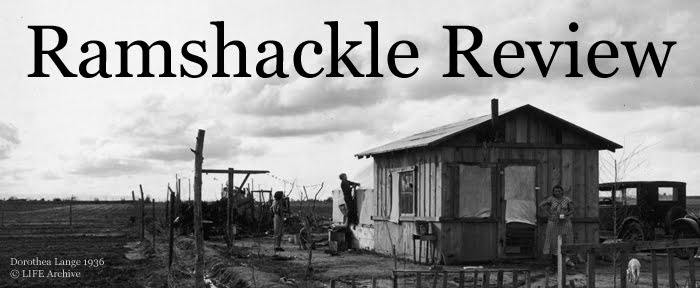Randi Beck:
Two Poems
Two Poems
Perforation III: She and Me
She's the one who won't usually tell lies. Late evening, blue porch, I am passing through bars of lemon-colored light cutting the wood steps as though with tally marks to count this day separate but equal to the one before and the one before; she writes the bills, I the letters; she sees the blue porch for the poetry that it is, and I call the dog inside and lock the door. I'm a collector (you must understand this) of threadbare book covers, of wine corks stained red, of bones of large predatory birds, of galvanized tin, dying plants, collector of dust, collector of everything. She calls me sentimental, and often cruel, and often impatient, selective. To be fair, my voice by now must sound of rattling pills, or a can of loose coins, and it makes no difference (she will not go) whether I write harder, or longer, or quieter, or faster, or more presently, more thoroughly, more disaffectedly, more like boiling water, more like sex. And it is, I suppose, this kind of intercourse, a masturbatory love, or sometimes seduction, or violence, or restlessness, or a kind of perversion. And I will go on loving, despising, admiring until our faces, palm lines, and arteries can no longer be distinguished from one another. Even now, there is her warm hand moving down my arm, a navigation of fingers, newly discovered sound, and she tries to convince me, whispering, to tell you something truer than this.
Parker, Porter, those are women who knew that to light a match is to set smoldering some particle of air, to transform it; they knew the difference between the vulnerable and the vulgar, a long cigarette tapped on the lip of a glass, ash falling, settling like skin and I can never promise her (or anyone) the cement certainty of right and wrong and writing and wronging; ash, after all, is still grey matter at best, and smoke too, and water held in the mouth, moth wings aimed at the light. When the places that once existed, existed still (blue porch, dripping window fan, garlic flowers, snowfakes in the tall grass, tin pail filling slowly with water), those were days I said to her that I could do this on my own, but even those were words she had dropped in my mouth like seeds just so I could hear myself say them. And anyway, it is true that every single thing I write or tell is a carefully punctured egg, drained of viscera, carefully placed in a high nest, carefully built.
So you see, even the empty things, I keep those too.
Mares at Night
Midwinter that year, Oklahoma was frozen at the center; the self-proclaimed “Heart of America” drained colorless under four inches of solid ice, the blood-red clay fossilizing every hoof print,boot track, skidding tire, or misstep; everything dusted over with snow. The twenty minute drive to work became an hour-long trek on empty, near-invisible highways and by the time I arrived it was already dark, everyone had gone home, and the barns glowed faintly yellow and pulsed with the breath of horses and the imminence of birth. Over the course of my eighteen years, I'd trained, ridden, or been stepped on by dozens of horses, mostly ranch horses, but also barrel horses and cutting horses, trail ponies, plow-pullers, cow-penners, fence-chewers, man-haters, woman-haters, gelded colts, stud colts, brood mares, trophy horses, swaybacks, nags, and what they call dog fodder, flag-carriers, carriage horses, police horses, curlies with disease, curlies without disease, horses beaten and starving or spoiled to vice, fearsome and feared, and now, the nameless clone-carriers, the recipient mares. Each breed came with its own set of expectations, the steady Quarters, flighty Thoroughbreds, Belgian drafts, Gypsy Vanners, hot-headed Arabs, air-headed half-Arabs, squirrelly Shetland ponies, and quiet Morgans, and most of them given ill-suited names or names based on general appearance, Red, Old Red, Big Red, Little Red, Socks, Two-socks, Blacky and Snow, Herme the hermaphrodite, Einstein who threw himself down a hill, Buddy who threw me down a hill, and Ms. Knight who was mostly a coward, Big Ben, Jackpot, Penny, and Money in a Glass. No amount of injury or poverty and certainly no human being could hobble me by then or change my mind about where I was going; maybe I was looking for too much at once, to write myself out of an old life, fearing erasure into emptiness, believing in the chafed skin of hard work, or that the blistering cold might burn out any nightmares I ever had about futility, but nothing could prepare my conscience for the approaching task of destruction, just as no amount of snow could prepare my body or the land for the impending devastation of winter, for the fields gleaming pure white even in darkness, the sounds of dying, the cracking of ice and bone
Randi Beck is an undergraduate student at the University of New Mexico in Albuquerque where she lives with her partner, fellow writer Samantha Tetangco. She has had fiction previously published in The Michigan Quarterly Review and The Kenyon Review. Before moving to Albuquerque to pursue writing, she worked as a horse midwife and graveyard waitress in Oklahoma. This is her first poetry publication.

No comments:
Post a Comment